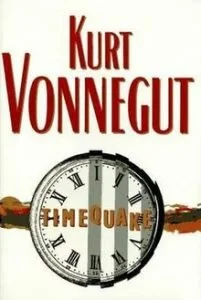On Re-Reading Books
For the first time in my life, I am re-reading books. Twenty years ago, I was sitting on a hotel balcony in Hawaii reading Timequake, a novel/essay by an elderly Kurt Vonnegut. I was an imprudent young man back then, excited by Vonnegut's transgressiveness and willingness to write truly crazy things. I adored him. I wanted to drive to Boston and take his creative writing class in the community college where he taught. I think Timequake was one of the last books of his I hadn't read yet. It's a book about how, in the year 2001, the universe had an existential crisis and reverted to the year 1991. Once there, it recovered its confidence and resumed expanding again. Everyone was forced to relive those 10 years exactly as they happened the first time.
Funny enough, it was right around the year 2001 when I sat on that balcony like a crazy person reading a book instead of playing in the water at the beach or slamming back mai-tais or whatever normal people do when in a tropical paradise. If that plot had happened to me, I would've gone from 21 years old, a newlywed young man, back to the age of 11. When I was 21, I was finally getting my life together, emerging from years of depression and emerging into a mature period of happiness and personal growth. When I was 11, I was playing roller hockey with my friends in the tennis courts behind my house. In between was a decade fraught with anxiety. Like most of us, my teenage years were filled with highs and lows. If I could live through them again, I could discover Meloncollie and the Infinite Sadness again. I could read Vonnegut for the first time again. I could also lay on the couch numb to the world again and wondering what the point of existence is. I could make all sorts of horrible mistakes again. I wouldn't mind being timequaked to Hawaii again but I would not want to be timequaked to 1991. Life goes on, as they say, and as I consider my present-day life I can only think, as Vonnegut would say, "If this isn't nice, I don't know what is."
My philosophy professor in grad school said that, once every 10 years it's a good idea to re-read the same book. This book should be something important to you, something against which you can measure the progress of your life. It will be a moral reckoning, an accounting of the passage of time and how well you've attempted to live in your particular corner of existence. You're not the same person when you re-read a book, and it's interesting to see how the text changes as you read it as a different person. For my professor, Dr. Hare, it was the Nichomachean Ethics. For me, it is Catch-22.
I re-read Catch-22 the other day. It's brilliant. It's funny and absurd and so, so dark. I always wondered if those books we were forced to read in high school English class were actually good. Some I'm not so sure about anymore. Catch-22, though, is way better the second time around. This time, I understood the T.S. Eliot joke. Is it because I'm a smarter, better reader now? I'm not sure. Maybe it's just that I'm different. Or, having lived this crazy life a few decades longer, I'm more appreciative.
My plan is to timequake my way back through all of Vonnegut's work. I'm hoping the fiction holds up as well as the essays. I don't always agree with the man, but he was a hell of a writer. After that, I'm wondering if I'll have the stamina to tackle Infinite Jest again. I used to be able to stay up late and read hundreds of pages at a sitting. Now, I fall asleep to re-runs of Cheers. Perhaps Infinite Jest is a project for a younger, more energetic version of myself. Maybe I should content myself with simply re-reading his essay about the time he went on a cruise and lost his mind. If this ends up being the case and I can no longer read for sustained periods of time, it will make clear to me that youth has its blessings, too. All I know is that, in about 10 years, I hope to re-read Catch-22.

